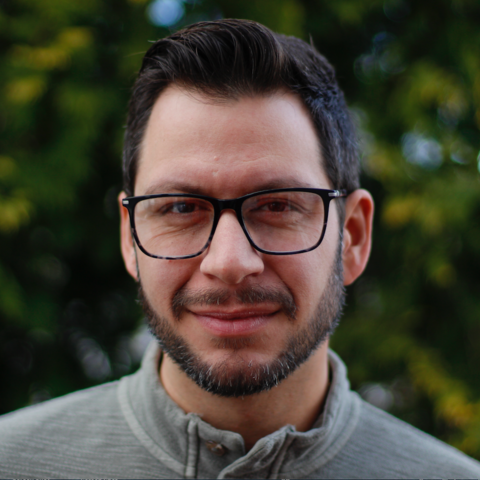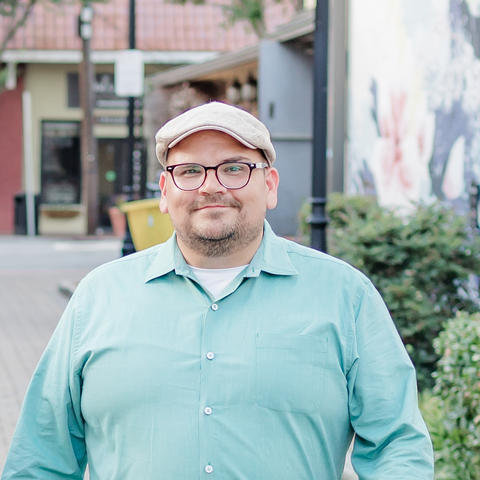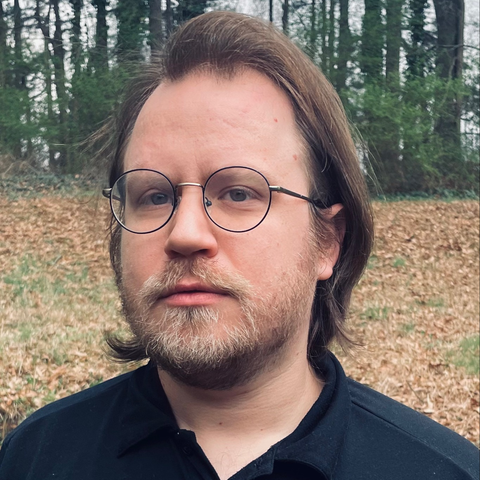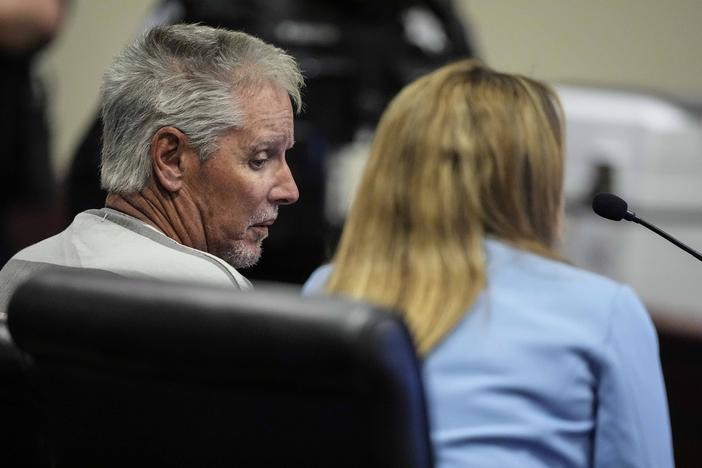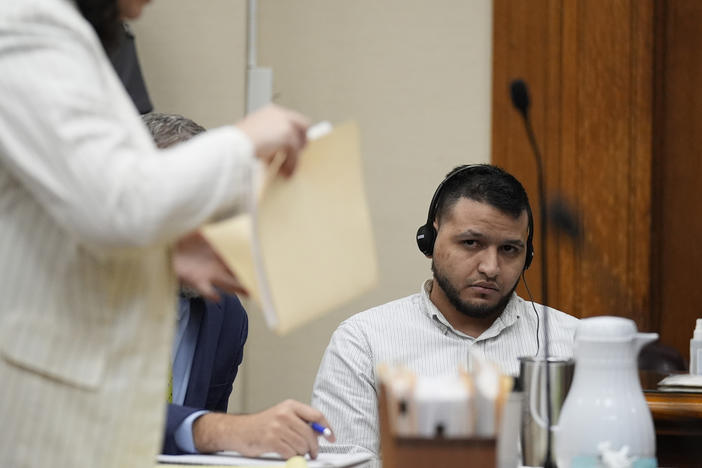
Section Branding
Header Content
Georgia Today: CNN ousts their CEO; 'Cop City' opponents file referendum; Adoption book author
Primary Content
On the Wednesday, June 7, edition of Georgia Today: CNN ousts their CEO; some opponents of the Atlanta public safety training center change tactics; and an author looks at the emotional impact of giving up a child for adoption.

Peter Biello: Welcome to the Georgia Today podcast from GPB News. Today is Wednesday, June 7. I'm Peter Biello. On today's episode, CNN ousts its CEO. Some opponents of the Atlanta public safety training center change tactics. And an author looks at the emotional impact of giving up a child for adoption. These stories and more are coming up on this edition of Georgia Today.
Story 1:
Peter Biello: Groups opposing the construction of a new police training center have filed a referendum with the city of Atlanta that could stop construction of the controversial facility. GPB's Amanda Andrews reports on today's announcement.
Amanda Andrews: The referendum could put the measure on the ballot in November and possibly stop construction of the $90 million facility. The Atlanta municipal clerk has seven days to approve the referendum and provide an official petition. Organizers will then have 60 days to collect signatures from at least 15% of registered voters, or around 71,000 signees. Community Movement Builders founder Kamau Franklin says it's unfortunate that people living closest to the site in DeKalb County won't be able to vote.
Kamau Franklin: They have not been given a voice in this process. They've not been given a voice by the commissioners in DeKalb County, and they certainly have not been given a voice by the people here in Atlanta or the mayor here in Atlanta.
Amanda Andrews: Once collected, the petitions will go to the city council to validate the signatures, placing the measure on the November ballot. For GPB News, I'm Amanda Andrews.
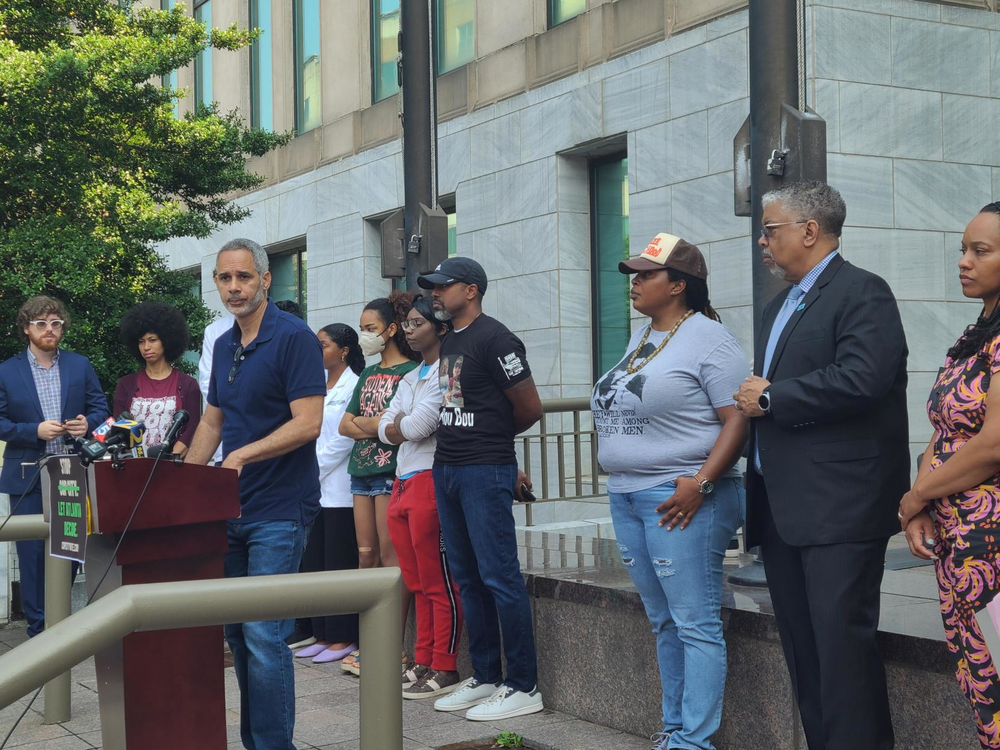
Story 2:
Peter Biello: Atlanta City Council members voted yesterday to increase taxi fares to make cabs more appealing for potential drivers. Atlanta Checker Cab president Rick Hewatt says he's down to about 40 drivers, compared with 200 before Uber and Lyft. He says Atlanta officials hadn't increased taxi fares in about 18 years.
Rick Hewatt: Timing is everything. It wasn't the time to raise the rate when we were fighting Uber and Lyft. It wasn't the time to ask for a rate increase when there's an international pandemic happening.
Peter Biello: Riders will now pay about 20% more across the board. Hewatt says even with the rate increase, the cost of a taxi will still be lower than rideshare services.
Story 3:
Peter Biello: Macon-Bibb County cut the ribbon yesterday on a new park on the city's south side. The park is paid for with money from a special purpose local option sales tax. And as part of the city's effort to replace blighted properties with community spaces. GPB's Sofi Gratis has more.
Sofi Gratis: Lily Lewis plays on the brand-new playground off Halsted Avenue, testing out the slide and outdoor instruments. Her dad, George Lewis, was one of many neighbors at the park's ribbon-cutting.
George Lewis: To me, it means just a reflection of my mother, of her vision of how she felt about making and the community that she loved.
Sofi Gratis: The park is named after George Lewis's brother, Frankie Lewis, who died in 2019.
George Lewis: Every community needs a park, you know.
Sofi Gratis: Before he cut the ribbon on the new park, George's brother, Antonio Lewis Ross, says he's proud to see the city investing in his neighborhood.
Antonio Lewis Ross: What she would say now is like, "Hey, South Macon is no longer a spectator to change."
Sofi Gratas: The park also has basketball courts, picnic tables and greenspaces. For GPB News, I'm Sofi Gratas in Macon.
Story 4:
Peter Biello: A new study finds that the percentage of women employed in federal STEM positions hasn't changed since 2005. That's according to researchers at the University of Georgia's School of Public Policy and International Affairs. They looked at employment data from 17 federal agencies with substantial STEM employment. Women account for less than 30% of STEM workers in some agencies, while others with more women in supervisory roles had around 42%. The study also found that women continue to quit federal STEM jobs at disproportionately high rates.
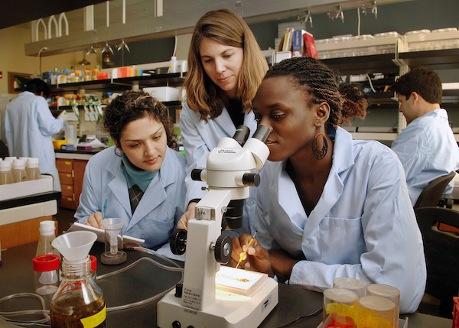
Story 5:
Peter Biello: The parent company of Atlanta-based CNN has ousted the network's CEO. Warner Brothers Discovery announced this morning that Chris Licht is leaving CNN. The move follows a loss in confidence in Licht among the network's journalists, and a series of missteps, including a live town hall with former President Donald Trump that was filled with falsehoods.
Story 6:
Peter Biello: The former president of the latest version of the United States Football League is launching a spring football league for high school players. Brian Woods says his prep superleague will begin next year with a six week season with teams in a dozen cities including Atlanta. Woods says his league will use NCAA playing rules and will operate independent of high school state athletic associations, thereby giving players the chance to profit off their name, image and likeness without any restrictions.

Story 7:
Peter Biello: Before the Supreme Court issued its decision in the early 1970s protecting a woman's right to an abortion, women who got pregnant outside of marriage often were sent to maternity homes, where they were pressured and shamed into giving up their babies for adoption. Later, when women had the right to an abortion, some still chose adoption, but that choice was rarely simple and not without its consequences. A new novel by Atlanta author Julia Franks tells the story of two women whose unplanned pregnancies resulted in heart-wrenching adoptions. It's called The Say So. Julia Franks joins me now. Welcome to the program.
Julia Franks: So great to be here, Peter.
Peter Biello: This book was riveting, I have to say.
Julia Franks: Oh, thank you. Oh, thank you.
Peter Biello: It put me in situations I had no knowledge of, including these maternity homes, which we'll talk about. But first, I want to talk about the two women who experienced these unwanted pregnancies and what happened with them. One was Edie, who in 1959 — a different planet, it seems, 1959 — ended up in a maternity home. I'm wondering if you could tell us a little bit about Edie, who she was and what her circumstances were.
Julia Franks: I think of her as somebody who's born relatively lucky — great family, good socioeconomic situation, also happens to be beautiful. So she's in some ways the luckiest of people until she gets pregnant at the age of 16. And then she does end up in a maternity home and it's her parents’ choice, which is the way it was in a lot of cases. And she doesn't really realize that once she's in that home, she's already on this track where she doesn't really get a vote anymore.
Peter Biello: Yeah, she doesn't have "the say so," which is like the thread throughout this novel. And she decides early on that she wants to keep this child and raise the child herself. But you say she's well-resourced. Her family is well-resourced, but she, as a 16-year-old and 17-year-old, does not have the resources or the street savviness to work around a system that is just bent on getting her to give up this child for adoption. Is that something that you encountered in your research about these maternity homes? Like that's something very typical of what happened there?
Julia Franks: Yeah, and it was a certain zeitgeist where people just didn't question — that in the case of unplanned pregnancy, adoption was always the best solution. And so young women like Edie, they ... thought they had some choice and some free will. But sometimes social workers, sometimes doctors, often your own parents sort of pushing you in this direction.
Peter Biello: Psychologists were also suggesting that you're not well mentally and that the fact that you want this child means you are unwell and therefore you are unfit.
Julia Franks: Right. Yeah. And that — that — this whole psychological component that was a big thing. We would call it today, "Oh, well, that's medical gaslighting," but that was part of it.
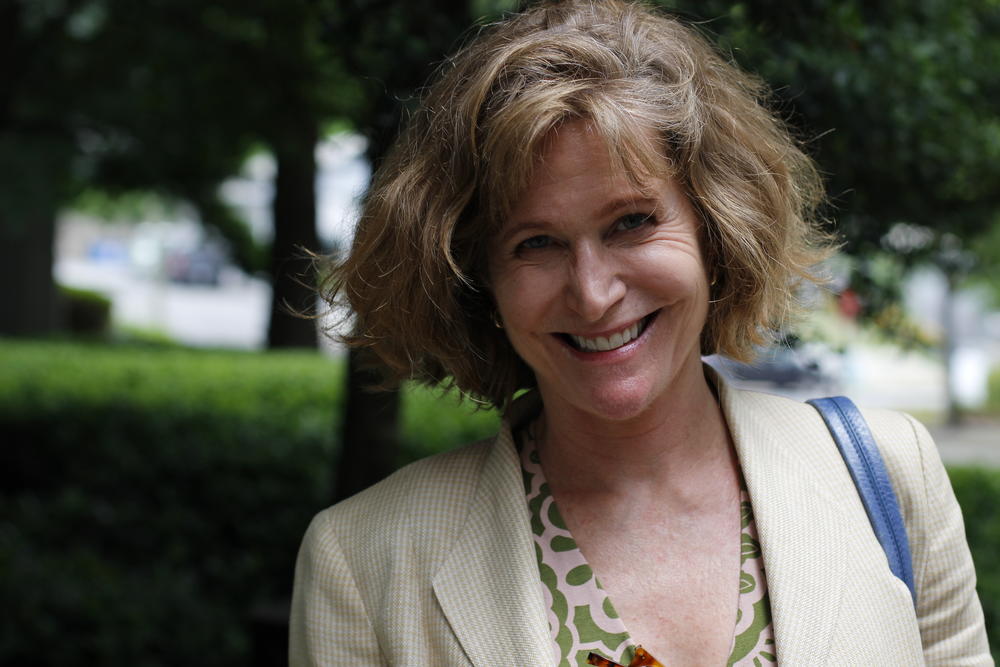
Peter Biello: And then there is Meera, who is the child of Edie’s high school friend. And she, in the mid-1980s, when abortion is an option for her, legally, decides that she still wants to adopt. Can you tell us a little bit about Meera?
Julia Franks: I wanted the second part of the story to be set in the 1980s because it's after the women's rights movement when people do have more choice. But the character of Meera is based to some extent on my own experiences. So I did have an unplanned pregnancy in college, and I did for many reasons, complicated reasons, some having to do with naivete, some having to do with overconfidence — like, I was an overconfident kid! — I chose to have the baby and give him up for adoption. You know, I felt, well, I can bring this child to term, finish my senior year, continue my three nights a week waitressing job and figure out what I'm going to do with the rest of my life. I thought, well, it's not going to be easy, but doable. Right?
Peter Biello: You think. You think it's doable and then reality comes crashing in.
Julia Franks: Oh, it's so — it was so much harder than I ever imagined. I didn't take emotional risk into account. I didn't take physical risk into account. I didn't take loss into account. And I didn't really take grief into account. Certainly not the kind of, you know, decadeslong grief that most women experience.
Peter Biello: So is that why you wrote this book to make sure that the accounting of the emotional consequences is at least out there for people to consider? Because this book is all about the emotional consequences of, first, when it is not really a choice, when adoption is forced on the mother in Edie's case, and then when it is a choice in Meera's, because both — they feel it and they feel it hard.
Julia Franks: I would say for sure. When I when I started it, it was in some ways a way for me to work through my own feelings.
Peter Biello: So the ripple effects for you, you've been thinking about this for a long time in the same way that Meera thinks about it for a long time, and Edie thinks about this for a long time. And it's not something that you can just put — put aside and forget.
Julia Franks: Yeah, sure. That's exactly right. I mean, there's a — so there's this fable that has to do with adoption, which it has two parts, actually. The first part is that if you have an abortion, you'll be traumatized for life. And the second part of the fable is that if you release your child for adoption, you'll be some kind of hero, right? And I would say both parts of that fable are 180 degrees wrong. And I actually thought the fable was something that was sort of this relic of the 1950s and 1960s. But it's coming back. It's back. It's already back.
Peter Biello: Like a fable? You say a fable that's being told to pregnant women as they're trying to make up their minds on what to do?
Julia Franks: Absolutely. Absolutely.
Peter Biello: And who's telling this fable? Is it the family members? Is it social workers? Clinicians? Everybody?
Julia Franks: Not everybody, but people in all those groups. Certainly, you know, evangelical churches are big proponents. But the most — the most obvious person is Amy Coney Barrett. [Supreme Court] Justice Amy Coney Barrett. She's said women don't really need to have abortion rights because they have the option to relinquish their children for adoption. I don't know how many pregnant women you've been around, but if you have been around some, you know that there's this hormonal transformation that happens to women when they're pregnant. They get — all these mommy hormones sort of dump into their system. And those chemicals, those hormones help them create a bond with their child in utero. And you're going to get those hormones whether you want them or not, you know. And it is pretty naive — and I include myself in that — it's pretty naive to think that you won't be affected by them.
Peter Biello: Mm hmm.
Julia Franks: And I mean, Justice Barrett should know better because she's been through pregnancy. She should know. Anyway, so —
Peter Biello: Have you sent her a copy of the book?
Julia Franks: No, I haven't. I would love it if she would read it.
Peter Biello: Well, Julia Franks, thank you so much for speaking with me. I really do appreciate it. And congratulations on your book.
Julia Franks: I so appreciate being here. Thank you, Peter.
Peter Biello: That is Julia Franks, author of the new novel The Say So.
And that's it for this edition of Georgia Today. Thank you so much for tuning in. If you want to learn more about any of these stories, head on over to our website, GPB.org/News. And remember to subscribe to this podcast. We will be back in your feed tomorrow afternoon. And if you have feedback or a story idea or just want to drop us a love note, we're happy to hear from you. Email us. The address is GeorgiaToday@GPB.org. I'm Peter Biello. Thanks again for listening. We'll see you tomorrow.
___
GPB's Georgia Today newsletter hits your inbox on Tuesdays, Wednesdays and Thursdays with top stories from around the state featuring news, politics and more. Subscribe here.
Secondary Content
Bottom Content

